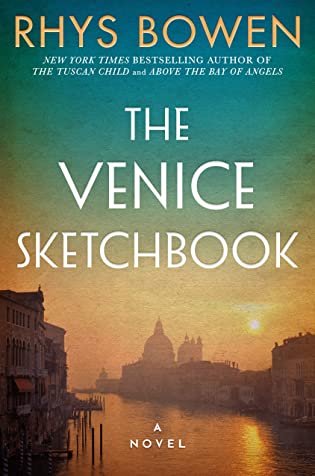 The Venice Sketchbook by Rhys Bowen
The Venice Sketchbook by Rhys Bowen Format: eARC
Source: supplied by publisher via NetGalley
Formats available: hardcover, large print, paperback, ebook, audiobook
Genres: historical fiction, historical romance, World War II
Pages: 412
Published by Lake Union Publishing on April 13, 2021
Purchasing Info: Author's Website, Publisher's Website, Amazon, Barnes & Noble, Bookshop.org
Goodreads
Love and secrets collide in Venice during WWII in an enthralling novel of brief encounters and lasting romance by the New York Times bestselling author of The Tuscan Child and Above the Bay of Angels.
Caroline Grant is struggling to accept the end of her marriage when she receives an unexpected bequest. Her beloved great-aunt Lettie leaves her a sketchbook, three keys, and a final whisper…Venice. Caroline’s quest: to scatter Juliet “Lettie” Browning’s ashes in the city she loved and to unlock the mysteries stored away for more than sixty years.
It’s 1938 when art teacher Juliet Browning arrives in romantic Venice. For her students, it’s a wealth of history, art, and beauty. For Juliet, it’s poignant memories and a chance to reconnect with Leonardo Da Rossi, the man she loves whose future is already determined by his noble family. However star-crossed, nothing can come between them. Until the threat of war closes in on Venice and they’re forced to fight, survive, and protect a secret that will bind them forever.
Key by key, Lettie’s life of impossible love, loss, and courage unfolds. It’s one that Caroline can now make right again as her own journey of self-discovery begins.
My Review:
This dual timeline story follows the adventures – and misadventures – of two women in two separate eras but in the same exact place, La Serenissima. Venice.
Their stories are linked, not just by the city, and not just by these two women’s relationship to each other, but also to a family that influences both of their lives.
They are also both at points in their lives when they are making fresh starts – and bittersweet endings.
As we meet Caroline, her marriage is ending, and so is the life of her beloved great aunt, Lettie. Lettie and her sister, Caroline’s grandmother Winnie, raised her after the death of her own parents in their tiny country town not too far from London. Caroline loves both women, but Lettie has been both her inspiration and her rock for all of her life, and now that support is gone.
Leaving behind one final request, that Caroline go to Venice, a place that Lettie seems to have loved but that Caroline never knew was such a part of her great-aunt’s life, along with enough money for Caroline to make the trip, scatter Lettie’s ashes, and perhaps figure out what made the request so important to the dying woman that she hung on long enough to make that one last request.
So Caroline goes to Venice to learn what she can, in hopes of figuring out what compelled Lettie, and to take the opportunity to figure out where her own road will lead her next.
What she discovers, or who she discovers, is the woman her staid, upright, prim, proper and utterly respectable great-aunt Lettie used to be. A young woman named Julietta, an art student trapped in Venice when Britain declared war on Italy.
A woman who became a spy, a mother, a prisoner of war and a refugee. A woman who left behind everything she loved and everything she held dear to make a new life back in her old home. A life that seemed to be a complete rejection – or a tomb – for the woman she had once been.
A woman determined, in her last moments, that it was time for someone she loved to uncover her truth.
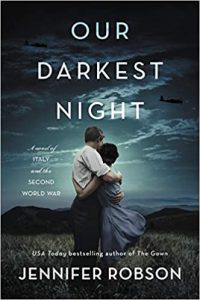 Escape Rating B-: World War II is a rich period for historical fiction of all types and stripes. To the point where I have three books in a row that are set during the same period, Friday’s The Consequences of Fear, this book today, and tomorrow’s The Last Bookshop in London. This is also not the only book this year to be set in World War II Italy, the other being Our Darkest Night by Jennifer Robson, which is somewhere in my virtually towering TBR pile.
Escape Rating B-: World War II is a rich period for historical fiction of all types and stripes. To the point where I have three books in a row that are set during the same period, Friday’s The Consequences of Fear, this book today, and tomorrow’s The Last Bookshop in London. This is also not the only book this year to be set in World War II Italy, the other being Our Darkest Night by Jennifer Robson, which is somewhere in my virtually towering TBR pile.
All that’s to say that it feels like parts of this story have been done before, and recently, and perhaps for this reader a bit of World War II historical fiction fatigue has set in. So I found this take on that historic conflict to be a bit too much like too many things I’ve read before, in spite of the change in setting.
And as a result of that fatigue I enjoyed Caroline’s side of the story more than I did Julietta’s. I’d rather have seen Caroline actually researching Lettie’s history rather than just reading Lettie’s diary.
I think that the issues I had with Lettie/Julietta’s part of the story was that so much of what she did has been written before, and the parts of the story that were unique to her were a bit too predictable, especially her doomed romance and its results.
Let’s just say it was a VERY good thing for Caroline that Lettie was her great-aunt and not her grandmother.
One piece of Caroline’s story that I felt a great deal of resonance for was the way that it intersected with 9/11 and its aftermath, both in the portrayal of how countries outside the US both viewed the tragedy and moved on, and the way that it impacted people who were not remotely close to the event. It echoed for a while for all of us, and that was captured well.
So this is a story I’m kind of on that painful fence about. I liked Caroline a lot, I ended up seeing Julietta as both heroic and incredibly naïve at the same time, and I wanted the 21st century story more than I did the historic one. Your mileage may vary, especially if you’ve not experienced the same kind of WW2 historical fiction fatigue or you’ve not read much about that period in Italy as opposed to the more usual settings of France or Britain..
And on my other hand, I have previously enjoyed several of this author’s WW2 stories, particularly In Farleigh Field and The Victory Garden and will undoubtedly be back again the next time she returns to the period.


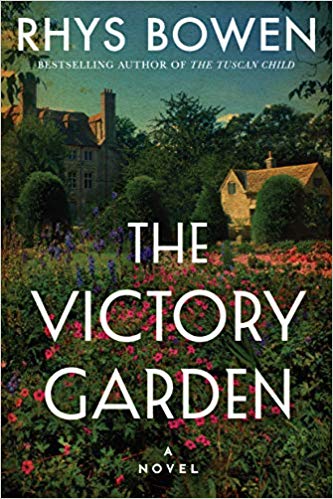 The Victory Garden by
The Victory Garden by 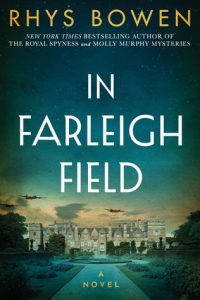 However, just as
However, just as 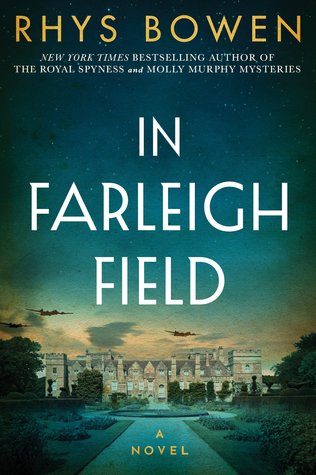 In Farleigh Field: A Novel of World War II by
In Farleigh Field: A Novel of World War II by